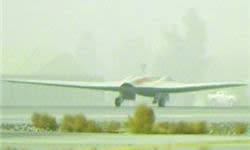 The Envoy
The EnvoyCyber experts, Pentagon skeptical Iran brought down U.S. drone

A day after the Pentagon acknowledged that an unmanned American reconnaissance drone went missing while on an operation in western Afghanistan late last week, Defense officials still smarting from the incident have come forward to dismiss Iranian claims that the drone was brought down by hostile activity. And American cyber experts similarly expressed skepticism over Iranian contentions that hackers based in Iran brought down the drone by penetrating its software or jamming its signals.
"The one thing I can tell you is we don't have any indications that the UAV [unmanned aerial vehicle], that we know we no longer have, was brought down by hostile activity of any kind," Pentagon spokesman Capt. John Kirby told reporters at a Pentagon press briefing Monday otherwise short of many further details on the embarrassing incident, ABC News's Luis Martinez reported. "As it says in the statement, the controllers lost control and, without getting into specific details, I think we're comfortable stating that there's no indication of hostile activity."
Likewise, the reported contention made by some Iranian military officials that an Iranian cyber-warfare unit commandeered the drone strains credulity, cyber-security expert James Lewis said.
"Iran hacking into the drone is as likely as an Ayatollah standing on a mountain-top and using thought waves to bring it down," Lewis, a former Reagan administration official now with the Center for Strategic and International Studies, told Yahoo News by email Monday. "The most likely explanation is that it crashed on its own."
"If you could hack into a drone, you wouldn't use it for some spontaneous fun, you'd save it for a rainy day," Lewis continued. "You'd need to be able to hack either the control network in the U.S. or a satellite. Neither is easy, and both are probably not something the Iranians can do."
Lewis also pointed out that alternative Iranian claims the Iran military shot the U.S. drone down seemingly contradict the contention the drone in their hands had sustained only limited damage. "If you shoot something down from that altitude, there are lots of pieces not 'nearly intact,' " he said. (Analysts have also noted that Iranian media have not published any photos of the drone the Iranian military allegedly acquired, thwarting the ability to assess how it fell to earth and in what state.)
"It's possible," he allowed, "that one of their aircraft bumped into it--the disadvantage of a drone not having a pilot is that situational awareness is limited." But Lewis stressed that this scenario, too, is unlikely.
Aviation experts meanwhile suggested that the intelligence damage from the alleged craft in question--a U.S. RQ-170 stealth drone--falling into Iranian hands is unfortunate, if perhaps somewhat mitigated by the fact it employs stealth technology that is now a few years old.
"Even if Iran has, as it claims, shot down a Lockheed Martin RQ-170 unmanned aerial system (UAS), the single-channel, full-motion video capability that made the stealthy flying wing so invaluable when it debuted in Afghanistan about two years ago is considered outdated, potentially limiting the intelligence fallout," Aviation Week's David Fulghum and Bill Sweetman reported Monday.
Lewis however countered that interpretation sounded like wishful thinking--or perhaps Air Force spin--to him. The technology is "dated, yes," he said, "but still more than our ... foreign friends have." (The Pentagon, for its part, has declined to confirm the model of drone lost.)
Through all the speculation, disclaimers and spin, one thing is clear: It's a major embarrassment for the Pentagon to have a valuable drone fall into the hands of Iran, however it got there. And it's all the more awkward for Iran to gain this strategic and public relations advantage at the current moment, as U.S. diplomats are making a concerted push to impress leaders of the Islamic republic with the harsh consequences for its alleged defiance of international demands to curb its nuclear program. "From the beginning of RQ-170 operations, indications from the intelligence community were that Iran's missile program was one set of targets of interest, as was its nuclear weapons program," Fulghum and Sweetman wrote.
Meanwhile, one last, and perhaps obvious, disclaimer: American military officials do not seem to be harboring expectations that Iran will simply haul off and return their drone.
In reply to a media question presenting this prospect, the otherwise tight-lipped Pentagon spokesman Kirby replied simply, "No."
Other popular Yahoo! News stories:
• Iran claims to hold downed U.S. spy drone; Pentagon acknowledges drone lost
• Jobless in Iowa: a third of Iowa's unemployed looking for work for more than six months
Want more of our best national security stories? Visit The Envoy or connect with us on Facebook and on Twitter. Want more politics? Visit The Ticket or connect with us on Facebook and follow us on Twitter.
